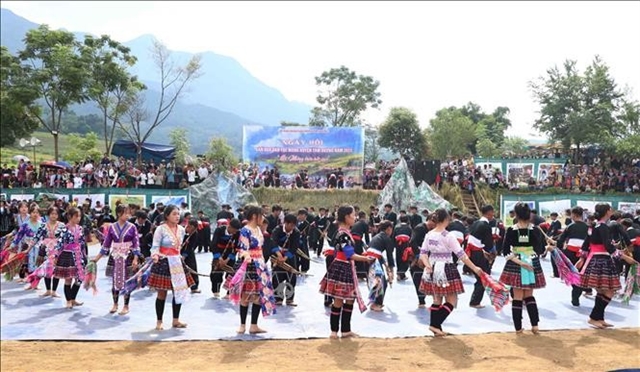 Talk Around Town
Talk Around Town

 |
| Illustration by Trịnh Lập |
by Nguyễn Mỹ Hà
Summer has always been a great time of year when overseas students come home looking for internships. Senior students may stay in their host countries looking for summer work, but most freshmen, if they can afford the airfare and cut costs on accommodation, will jump on a plane and head home after the finals.
After the pandemic, this year has seen the number of students heading elsewhere in the world to study steadily on the rise. According to Times Higher Education, the number of Vietnamese students studying in South Korea tops the list of international students in the Northeastern Asian country. Việt Nam has more than 70,000 students in South Korean schools and colleges, followed by China with 64,000.
The list of countries Vietnamese students have enrolled for college education can be listed as follows: Australia, 30,000 students; the US, 29,000; Canada, 21,000; the UK, 12,000; and China, 11,000.
With the flow of young students leaving the "bamboo bushes" at home to pursue knowledge and job training elsewhere, parents and the education officials hope they will come back armed with not only a chosen career, but a new attitude, with more critical thinking and a youthful approach to problem-solving.
"I can't believe how my son has changed for the better," said Trần Như, a mother of two, who sent both of her sons for college in Australia.
"In no time, he has stopped playing games online, found himself a job in a local supermarket, bought some food with an ingredient he would refuse to eat while at home."
When his mother asked if he threw away the food he didn't like, "No way," was his answer. "Even if it didn't taste good as your food, Mum, I'd just eat it up."
While the number of graduates coming back to work in Việt Nam has been hard to nail down, we all know for sure that of all graduates who got to study in Australia, few came back. But that doesn't reflect the whole picture. Those who studied on their parents' savings, or on host institutions fellowships, were not counted. Before they ended up settling down in the west, the students still went home and established some connections in the workplace.
Work places get a new injection of youth and positive energy, while their parents beam with delight to have their kids home for a while.
Studying abroad has been a trend to send bright students away for decades. But many went ill-prepared and faced mounting difficulties in terms of integrating into a new life, with a new way of living and studying. It's not easy to cope with everything all at once, especially while away from home and alone in a foreign country.
But thanks to the student associations, the local hosts and the school's students affairs office, they soon get themselves up and running, especially with new and fascinating things to learn.
There can be rainy days, sick days or broke days when you have little or no money left for food. There could be bad days when they tried their best, but still couldn't pass their exams.
But challenges temper the will and today it is one of the best choices for excellent students who wish to study well. Domestic colleges and institutions have connected with counterparts in 500 exchange programmes in more than 30 countries. If you really want to study, enrolling in colleges in Việt Nam can also lead you to an exchange programme abroad.
"Being merely 18 or 19 and heading on your own to a new country, speaking a new language, living a new life can be a bit much for a young person to adapt to," said Nguyễn Hương, 51, also a mother of two.
"I've studied abroad, I knew there were appeals but also traps for students quitting their studies, gambling online, getting involved in drugs or alcohol, and totally derailing long before their parents knew. I'd rather wait for a couple of years, and let them study for a year or two in college at home, when they become more mature, they will be ready to go charter new waters."
In domestic colleges, the youth do not just focus on studying anyway. They have to spend a few weeks in a real military barrack, studying basic army duties. They learn to survive on minimal resources, sleep on hard wood panel beds, put on an army uniform and make their blanket and mosquito net perfectly square, like a solid piece of brick.
They also learn how to be a member of a working unit, to follow rules, and help out each other. At night, music, dance and songs fill the air.
"My son plays keyboards and guitar well," Hương said. "So, every night, he would play for the fellow campers, accompany them and have an enthusiastic nightly audience of more than 1,000 people."
After the military camp time, the students came home all ravishing and renewed, and some fell in love before going back to school.
Whether at home or abroad, Vietnamese youth face challenges, but each must do his or her bit to help build their country. In them, we trust. VNS




